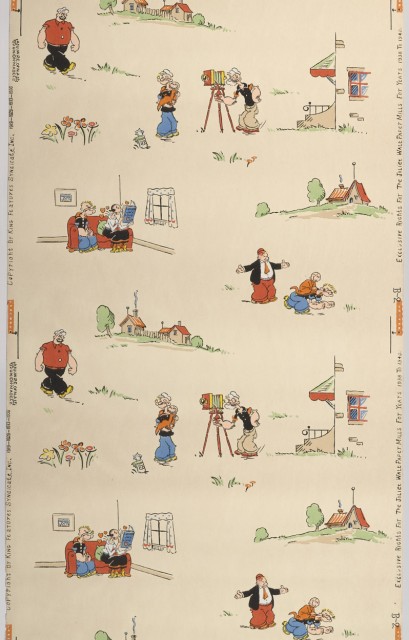This children’s wallpaper illustrates characters from Thimble Theatre. Along with Popeye, Olive Oyl and Swee’Pea, the paper also shows Bluto (forever Popeye’s nemesis), Poopdeck Pappy (Popeye’s father), and Wimpy (who will gladly pay you Tuesday for a hamburger today.) The scenes are arranged in a traditional figural landscape-style format with scenes taking place both indoors and out. The paper is clearly meant to entertain and amuse, from Popeye’s horsing around with Swee’Pea, to Olive Oyl’s reading of Lumber Jack Love, much to Popeye’s chagrin.
Children’s wallpapers first appeared in the 1870s and were originally designed to educate and not amuse the child. As notions of child development changed in the early years of the 20th century, so did wallpapers designed for children. They became less rigid in structure and it was now deemed okay to merely amuse the child and be decorative, but wallpapers could be also used to instruct children in good design. Other than the storytelling these scenes conjure, and the ensuing interaction between child and adult, this paper doesn’t offer much in the way of education. While many of the original Popeye strips were not politically correct, the scenes illustrated here are just good clean fun and after viewing this wallpaper, how could you not leave the room wearing a smile.
Popeye was created by cartoonist Elzie Segar who wrote the strip “Thimble Theatre” in the late teens and early 1920s. On January 17, 1929, Popeye made his first appearance in the strip. His first words, a reply to the question, “Are you a sailor?” were “Ja think I’m a cowboy!” Needless to say, Popeye went on to be the most popular character in the strip and one of the greatest comic characters ever. The first comic strip character to appear on wallpaper was Mickey Mouse, with Popeye following shortly after.
